7BUnit3--4
译林牛津版七年级英语下册7B unit4 知识点梳理

7B Unit4 <重点短语>1.have to 不得不,必须2.go straight on 一直往前走3.lie down all day long 整天躺着4.walk along 沿着...走5.turn left 向左转6.cross the bridge过桥7.walk past步行经过8.traffic lights 红绿灯9.plenty of大量,足够10.the way to 去...的路<重点句型>1.Sunshine Zoo is north of Sunshine Middle School.阳光动物园在阳光中学的北面。
2.--How will we get there?我们将怎样到那里?--We’ll get there by bus.我们将乘公共汽车到那里。
3.Go straight on, and you’ll find the Panda House.一直向前走,你们就会看到熊猫馆。
4.Remember that they are dangerous.记住它们很危险。
5.Birds make beautiful sounds when they sing.鸟儿在唱歌时会发出美妙的声音。
6.They jump around and make people laugh.它们上蹿下跳,惹得人们大笑。
7.Cross the bridge, and you will see the elephants.过了桥,你们会看到大象。
8.The food is above the drinks.食物在饮料的上方。
9.Walk past the house, turn left and walk along the path next to the river.走过这座房子,向左转,沿着河边的小路走。
10.The treasure is under the ground in front of the third tree on the left.宝藏在左边第三棵树前面的地下。
牛津译林英语7B Unit4课本知识整理

Unit 4 Finding your wayWarm up一、重点单词1.follow vt.跟随;仿效2.path n. 小路,小径3.again adv. 再一次,又4.afraid v. 害怕二、重点词组1.be afraid of.../be afraid to do 害怕.../害怕去做...2.go down 向下走go up 向上走3.have to 必须,不得不三、重点句型1.Are you sure, Hobo? 你确定吗,霍波?e with me. 跟我来。
3.show you friends how to get to your home. 向你的朋友展示如何到你家Welcome to the unit一、重点单词1.north n./adj./adv. 北,北方2.west n./adj./adv. 西,西方3.south n./adj./adv. 南,南方4.east n./adj./adv. 东,东方5.north-west n. 西北6.north-east n. 东北7.south-west n. 西南8.south-east n. 东南9.trip n. 旅行,旅游10.kilometer =(km)n. <英>千米,公里= <美>kilometer11.instruction[ɪn'strʌkʃ(ə)n]n. 指令;指示(instructions 复数形式意为说明,说明书)二、重点词组1.go on a trip to sp. = take a trip to sp. 去某地旅游2.be north/south/west/east of =be in the north/south/west/east of... 在…的北/南/西/东面3.bus stop 公交站4.by bus= on a/the bus 乘公交车三、重点句型1.Sunshine Zoo is north of Sunshine Middle School.阳光动物园在阳光公园的北面。
初一年级上学期7B Unit 3---4综合练习B

综合练习(B)I. 选择你所听到的内容(5%)( ) 1. A. work B. walk C. worked D. walked( ) 2. A. step B. sport C. stopped D. stop( ) 3. A. passed B. pass C. past D. bus( ) 4. A. weight B. way C. weigh D. wait( ) 5. A. usual B. usually C. unusual D. unusuallyII. 根据你所听到的上句选择符合逻辑的下句(5%)( ) 1. A. Just now. B. It‟s black. C. Yes, I did. D. In the bushes. ( ) 2. A. Yes, by bike. B. By plane. C. On foot. D. Walk.( ) 3. A. They …re ours. B. Yes, they‟re his. C. Yes, it‟s hers. D. No, it‟s yours. ( ) 4. A. Two bottles, please. B. Yes, I want.C. It‟s two yuan.D. Some milk.( ) 5. A. I was. B. My father did. C. My aunt does. D. Yes, my aunt.III. 单项选择(15%)( ) 1. Xingjiang is in the ____________ of China.A. northwestB. northeastC. southwestD. southeast ( ) 2. She is too young. She is afraid of ____________ at home by herself.A. stayB. stayingC. to stayD. to staying ( ) 3. ___________ , we caught the thief at the corner of the street.A. At the endB. In the endC. At firstD. In the last ( ) 4. He is quickly walking _____ the stairs and climbed______ his car and drove away.A. down / onB. up / onC. down / inD. down / into ( ) 5. A kangaroo needs its tail for _________.A. pushingB. pushing offC. pushD. push off ( ) 6. Can you hear a whisper? It _________ a small cat.A. soundB. soundsC. sound likeD. sounds like ( ) 7. _________ interesting news it is!A. WhatB. What anC. HowD. How an ( ) 8. These are ___________ cars. They are very beautiful.A. Mr. Yang‟s and Mrs. Yang‟sB. Mr. Yang and Mrs. Ya ng‟sC. Mr. Yang‟s or Mrs. Yang‟sD. Mr. Yang‟s and Mrs. Yang( ) 9. Excuse me, could you tell me ________ get to the railway station?A. how toB. where isC. the way toD. how can I ( ) 10. The train will go _____ a plain(平原) first, and then it…ll go ______ some tunnels.A. through / acrossB. across / throughC. into / onD. up / down ( ) 11. Mrs. Cai will go to Chongqing with her son __________ tomorrow.A. take a planeB. by airC. on planeD. by a plane ( ) 12. The River Seine flows(流淌)_________ Paris, the capital of France.A. overB. throughC. crossD. across( ) 13. “You‟d better write down ________ taught in class,” Mr. Sun said to the students.A. useful somethingB. nothing usefulC. everything usefulD. useful everything ( ) 14. We have to ______ these fact sheets of the museum _____ the museum guide.A. return / back toB. return / toC. give / toD. put / back to ( ) 15. Elephants can move ________ because walk on tiptoe.A. quiteB. quietC. quietlyD. quietlyIV. 用所给单词的适当形式填空(10%)1. “Oh, here it is!” Andy said to ___________ (he).2. The work is too hard. You can not do it __________ (easy).3. Man can‟t live __________ (with) air or water.4. Jim always gets to school early. It‟s __________ (usual) for her to be late.5. Please give _________ (they) a talk.6. Mike lives _________ (near) in Sunshine Town.7. The dinner ________ (taste) bad. Who ________ (make) it?8. We ______ (go) on a trip if it _______ (not rain) next week.V. 句型转换(14%)1. Is the schoolbag yours? (改为同义句)_____ the schoolbag __________ _________ _________ ?2. I knew the news after he told me. (改为同义句)I ______ know the news _______ he told me.3. There is nobody in the playground now. (改为同义句)There _______ ________ in the playground now.4. Shall we take a train to Shanghai? (改为同义句)________ ________ going to Shanghai _______ _________?5. The boy in white is listening to the teachers carefully.(改为感叹句)______________________________________________________________________________VI. 完成句子(21%)1. 请轮流朗读这些生词。
鲁教版英语七年级下册unit3-unit4复习

01
Theme
This unit explores the concept of past events and experiences, with a focus on narrative past actions
02 Grammar
It introduces the past simple tense, explaining its usage in narrative past events
Monologues
Longer speeches or presentations, delivered by a single speaker, covering a range of topics and ideas
News reports
Broadcasts or records of news events, designed to inform listeners about current affairs and issues
Review of Unit 3Unit 4 in the 7th
Grade English Volume 2 of the
Shandong
目录
• Unit Overview and Key Review • Listening training and skill guidance • Improvement of oral expression capability • Exploration of Reading Comprehension
Phrases related to daily routines in Unit 3 can be sorted under morning, afternoon, and even activities Phrases from Unit 4 can be categorized based on past actions at different timespans, such as yesterday, last week, etc
译林版7B期中复习(Unit1-4短语词组句型语法)

译林版7B期中复习(Unit1-4短语词组句型语法)7B知识点总结Unit 1 Dream homes一、词汇短语1.dream n/v:dream to do sth 梦想做某事;dream of…梦到…2. next to prep.在…旁边,仅次于=beside=near3. capital n/adj: 大写字母,资本/大写的,顶好的;the capital of …的首都(省会)4. have fun=have a good time=enjoy oneself 玩的开心have fun (in) doing sth5. enjoy a cup of tea 喝杯茶6. in the centre of 在…的中心7. share vt/n 合用,分享;份,份额share sth with sb; a share of 一份…8. ▲own adj/vt自己的; 拥有(owner n 拥有者) of one’s own 属于某人自己的;on one’s own=alone 独自的9. on the seventh floor 在第七层10. look out at 向外眺望;look out=be careful 小心,当心;look out of 从…向外看11. be different from 与…不同be the same as 与…相同12. be full of =be filled with 满是…13. some day 将来有一天,总有一天14. call v/n 打电话,拜访call sb=telephone sb=ring sb;give sb. a call=call sbcall sb back 回电话call on sb拜访某人;call at s.p参观某地15. message n.可数名词“消息,讯息”take a message稍口信leave a message 留口信16. at the foot of 在…脚下17. more than=over 多于…18.在足球场on the football field 在羽毛球场on the badminton court在游泳池里in the swimming pool19. invite vt邀请invite sb. to do sth ;invite sb to +地点/场合invitation n.二、重点句型1. Would you like sth/to do…? 肯定回答Yes,I’d love/like to ;否定回答No,thanks;Yes,I’d like to,but2. 电话用语(1)“电话问候”Hello/Hi; see you/bye/goodbye(2)找人May/Can I speak to…, please?或I’d like to speak to…, please?(3)请问您是哪位?Who’s calling? /Who’s speaking? /Who’s that?(4)自报家门如果你就是对方要找的人,那么你可以说:Speaking./This is…speaking.(5)稍等片刻Hold on,please./Wait a minute, please./One moment, please.(6)转告某人接电话There’s a telephone call for you, Amy./You’re wanted on the phone.(7)找不到接听的人,告知对方I’m afraid he/ she is n ot here at the moment.I’m sorry he/ she is out at the moment.主动相助Can I take a message?3. have an area of 数字+单位=be 数字+单位in size/area 意为“有…面积”三、语法A 基数词-数量(1)21~99之间的各数词,在十位数和个位数之间加连字符“-”。
译林牛津版七年级英语下册7B Unit4 按课时知识点梳理及拓展
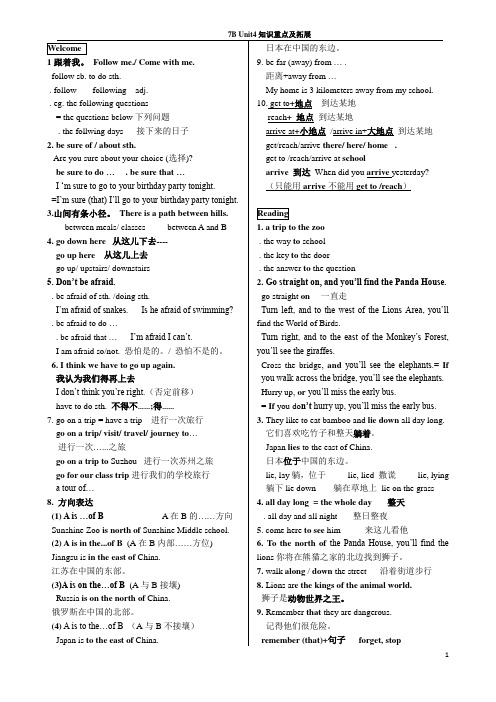
9. Remember that they are dangerous. 记得他们很危险。
remember (that)+句子 forget, stop
1
7B Unit4 知识重点及拓展
remember to do … 记得去做某事 (未做) Remember to close the window when you leave remember doing … 记得做过某事 (已经做过)
(4) A is to the…of B (A 与 B 不接壤)
Japan is to the east of China.
Cross the bridge, and you’ll see the elephants.= If
you walk across the bridge, you’ll see the elephants.
go up here 从这儿上去
1. a trip to the zoo . the way to school . the key to the door
go up/ upstairs/ downstairs
. the answer to the question
5. Don’t be afraid. . be afraid of sth. /doing sth.
Japan lies to the east of China. 日本位于中国的东边。
lie, lay 躺,位于 lie, lied 撒谎 lie, lying
躺下 lie down 躺在草地上 lie on the grass
4. all day long = the whole day 整天
. all day and all night 整日整夜
Review of 7B unit3&4

教案背景
• 在初三下学期, 面临中考,要想在中考取 得理想的成绩,就要抓住每个单元的知识 重点和难点,结合中考,在有限的时间内 有效复习整个初中的英语知识。本课为复 习七级下册uint3、uint4两个单元的知识。
教材分析
• 本课的教学内容为复习七年级下册英语 本课的教学内容为复习七年级下册英语unit3和unit4两个 和 两个 单元。话题分别为谈论动物和工作职业, 单元。话题分别为谈论动物和工作职业,语法知识点为复 习特殊疑问句的构成和运用。 习特殊疑问句的构成和运用。 • Unit3教学目标: 教学目标: 教学目标 谈论自己的喜好;询问他和人喜好; 谈论自己的喜好;询问他和人喜好;能够谈论喜爱某种动 物的理由做出自己的行动计划。 物的理由做出自己的行动计划。 语言目标: 语言目标: • 使用 使用like的一般现在时句型 的一般现在时句型 • 使用 使用like的一般现在时的疑问句,并做出肯定和否定的回 的一般现在时的疑问句, 的一般现在时的疑问句 答。 • 使用 使用what 和like的特殊疑问句 的特殊疑问句 • 名词的单复数的使用
interesting/exciting It is an_____________and busy __________job.
特殊疑问句
1.定义:用特殊疑问词引导的疑问句叫特殊疑句。 2.疑问词:疑问代词、疑问副词、疑问词组。 疑问代词:对主语、表语、宾语提问,有what(对 “物”提问),who(对“人”提问),which(哪一个), whose(谁的),whom(宾格“谁”)。 疑问副词:用于对状语提问,有when(何时), where(何地),why(为什么)how(怎么样)。 疑问词组:how soon ,how long ,how far , how often 等。
7Bunit3知识点整理

Unit 3 Welcome to Sunshine Town 1.an old friend of mine我的一个老朋友2.wait a minute等一会3.exchange students交换生4.take them to the shopping mall带他们去购物中心5.invite sb to do sth邀请某人做。
6.in the town center在镇中心7.local people当地人8.it takes sb some time to do sth某人花费。
时间去做某事9.Western restaurants西餐厅10.m iss the opera shows错过戏剧演出11.l ook forward to doing sth/sth盼望做某事/某事12.b elong to sb属于某人13.a ll over the place遍及那个地方14.t he Palace Museum故宫15.w orks of art艺术品16.l earn all about China’s history学习关于中国历史(的知识)17.t he golden throne金銮宝座18.r ow a boat on the lake在湖面上划船19.s mell the flowers闻花香20.h ear the bird sing听鸟儿歌唱21.r aise cows养牛22.g row wheat种小麦23.d rive us there开车送我们去那里24.h ope to do希望做某事25.h ope (that)+句子26.s ome…,and others…一些,另一些。
牛津译林七年级英语下册7BUnit3课本知识整理
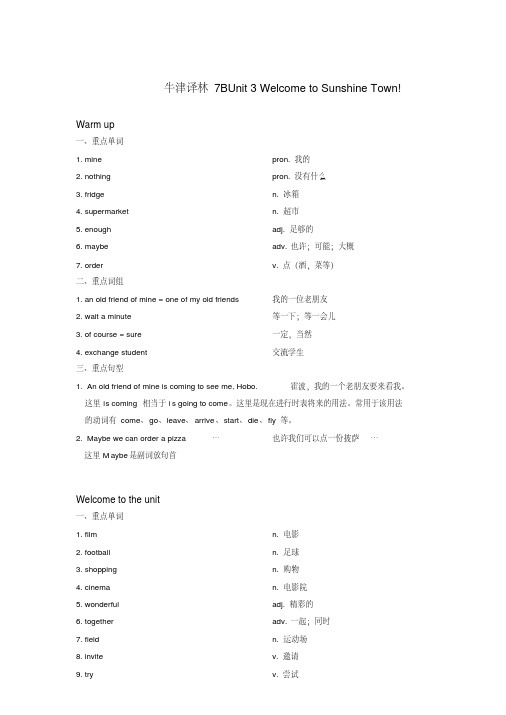
牛津译林7BUnit 3 Welcome to Sunshine Town!Warm up一、重点单词1. mine pron. 我的2. nothing pron. 没有什么3. fridge n. 冰箱4. supermarket n. 超市5. enough adj. 足够的6. maybe adv. 也许;可能;大概7. order v. 点(酒,菜等)二、重点词组1. an old friend of mine = one of my old friends我的一位老朋友2. wait a minute等一下;等一会儿3. of course = sure一定,当然4. exchange student交流学生三、重点句型1. An old friend of mine is coming to see me, Hobo.霍波,我的一个老朋友要来看我。
这里is coming 相当于i s going to come。
这里是现在进行时表将来的用法。
常用于该用法的动词有come、go、leave、arrive、start、die、fly 等。
2. Maybe we can order a pizza…也许我们可以点一份披萨…这里M aybe 是副词放句首Welcome to the unit一、重点单词1. film n. 电影2. football n. 足球3. shopping n. 购物4. cinema n. 电影院5. wonderful adj. 精彩的6. together adv. 一起;同时7. field n. 运动场8. invite v. 邀请9. try v. 尝试二、重点词组1. talk about sth.谈论某事2. take sb. to sp.带某人去某地3. invite ab. to do sth.邀请某人做某事4. I’d like to do = I want to do我想去做...三、重点句型1. We can watch some wonderful films together.我们可以一起去看一些精彩的电影。
2022江苏省牛津译林版7B Unit 3-4 重点句型短语归纳

Unit 3 Welcome to Sunshine Town1.an old friend of mine我的一个老朋友:of后接名代。
2.There’s nothing in the fridge.冰箱里什么都没有。
=There is not anything in the fridge. nothing=not anything;nobody=not anybody这是有be动词的情况,其否定在be后加not. 如果含行为动词,则在其前加don’t.例:I have nothing to eat.=I don’t have anything to eat.I didn’t eat anything.=I ate nothing.3. Wait a minute.=Just a minute.等一会儿4. Is it enough for a tin of dog food? 它足够买一听狗粮吗?be enough for sth:对…来说是足够的注:enough修饰名词放前面:enough foodenough修饰动词放后面:old enoughbe+adj+enough+to do sth:某人足够的adj以至于可以做…例:He is old enough to go to school. 他足够大以至于可以去上学。
She is strong enough to carry the box.她足够强壮以至于可以搬动这个箱子。
5.of course not.当然不了。
of course.当然了。
6.Maybe we can order a pizza.也许我们可以点一个披萨。
注意区别maybe和may be两个词。
以也许他是对的一句为例。
maybe放在一起是adv,通常放在句首: Maybe he is right.may be分开是两个词,may情态,后接be动词,位于句子中间:He may be right.7.They can try some Chinese food. 他们可以试试中餐。
牛津译林版7BUnit3知识点

Unit 3 Welcome to Sunshine Town知识点总结一、重点词组1. wait a minute 等一会儿2. a tin of dog food 一听狗食3. order a pizza 点一块比萨4. exchange student 交换生5. take them to the cinema带他们去电影院6. take them to the cinema带他们去电影院7. lots of things to do 有许多事情要做8. by underground 乘地铁9. some Western restaurants 一些西餐馆10. look forward to meeting you 期待见到你11. all over the place 到处都是12. the golden throne 金銮宝座13. works of art 艺术品14. Chinese paintings 中国画15. row a boat 划船16. know each other 相互了解17. raise cows 饲养奶牛18. grow wheat种植小麦19. smell the flowers 闻花香20. hear the birds sing 听鸟儿唱歌21. on a farm 在农场二、重要句型1. Welcome to Sunshine Town^送来到阳光镇。
1) “Welcome to + 地点”表示“欢送来到 .. !"如:Welcome to our school欢送到我们的学校来!2) welcome后面如果接副词,那么应省略介词to。
如:Welcome home/back欢送回家/回来。
2. An old friend of mine is coming to visit me, Hobo.is coming是现在进展时,表示将要发生的动作。
初三一轮复习(7B-Unit3-4)教学案

7B Unit3—4复习教学案重点词组swim across the pool 横游过泳池have to 不得不get out of the car 走出车子grow large teeth 长着巨大的牙齿drive away 开走run out of the building 跑出大楼run away 逃跑jump out of the van 跳出货车at once 立刻three men in police uniform三个穿警服的人take different routes 走不同的路线take another route 走另一条路be surprised to do 惊讶地做某事stop at the traffic lights 在交通灯处停下catch them in the end 最后抓住他们turn right / left 左转或右转stop talking 停止交谈at a crossroads 在十字路口walk / go along 6th Street沿着第六大街走zebra crossing 人行横道walk / go straight on 一直朝前走the corner of the road 街道拐角处cross the road 穿马路go through a tunnel 穿过隧道walk around the table 绕着桌子走walk down the stairs / steps走下楼梯/台阶jump over the chair 从椅子上跳过railway station 火车站live up to…活到…walk over / cross the bridge走过桥t he way to ……去某地的路 a bridge over a small river小河上的一座桥take her dog with her 带着她的狗walk towards the bridge 朝桥走win the game 赢得比赛see the doctor 看病start a campfire 生篝火walk past the station 路过车站a farewell party 一个告别会half of the students 半数的学生have a barbecue 吃烧烤invite …… to ……邀请某人做某事have a picnic 野餐complete the note 完成这张便条the route to ……去某地的路线amazing things 令人惊奇的东西as usual 像往常一样travel by rocket 乘火箭旅行in Africa 在非洲at the same time 同时keep your eyes open 使你的眼睛睁着walk on tiptoe 踮着脚走anything unusual 任何不同寻常的东西sleep with their eyes open睁着眼睡觉turn around 转身show them the ghost 给他们看鬼be frightened 害怕hear a strange noise 听到奇怪的声音float in water 在水里漂浮run into 闯入say to oneself 自言自语tell somebody everything 告诉别人每件事the animal centre 动物中心take care of / look after 照顾the following Sunday 下个周日be fond of music 喜欢音乐be not afraid any more 不再害怕soft noise 柔和的声音be crazy about 为…疯狂kick a stone or a can 踢石头或罐头cartoon films 卡通电影wake up early 早点醒来a hard-working student 一个勤奋的学生be poisonous 有毒a baby panda show 一个小熊猫展览at birth 在出生时take turns to do…轮流做某事fact sheets 资料单push off 推动the tallest man in history历史上最高的人in the daytime 在白天the weight of 6 elephants六头大象的重量eat 100 pounds of grass 吃100磅的草return ……to the museum guide把…还到博物馆的图书馆smell things as well as dogs can 能像狗一样嗅觉灵敏understand more about animals 更多地了解动物remember your words about tortoises 记住你关于乌龟的话the biggest living animals on land 陆上活着的最大的动物in the back of elephants‟ feet 在象腿的背部walk in the mud easily 在泥地里轻松的行走try to open the door with a knife 尝试用小刀打开后门push them in the back of a van 把他们推进货车后面ask them about the robbers 向他们询问小偷的事walk from the sofa to the window 从沙发走到窗户at the other side of the park 在公园的另一边take the second turning on the right 在第二个拐弯处向右转hear a whisper from the bushes 从灌木丛听到低语make a sound like a whisper 发出一个低语似的声音have enough poison to kill 有足够的毒可杀死语法精讲1. 移动的方向介词(Prepositions of movement)1) 常用的移动方向介词(词组)成反义词:down---up, from---to, into---out of, off---on有关联的:across---over, across---through---past, down---along其他:onto, round2) 使用时的注意点A. across和over:这两个单词都可以用在“过桥”时,walk across/over the bridge,over还可以表示“越过”,climb over the hill, jump over the chair, fly over;B. across和through:这两个单词都表示“穿过”,但across是“从表面横穿”,而through是“从内部穿过”,swim across the river, go across the street / playground, climb through the window, walk through the forest(森林);C. up和down是反义词,up表示“向上”,down表示“向下”。
7B Unit3 Finding your way 课时练习4(Grammar)
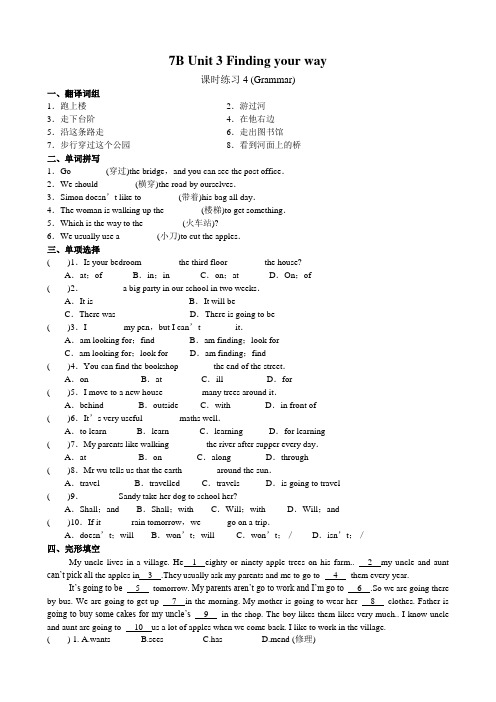
7B Unit 3 Finding your way课时练习4 (Grammar)一、翻译词组1.跑上楼___________________________ 2.游过河___________________________3.走下台阶_________________________ 4.在他右边_________________________5.沿这条路走_______________________ 6.走出图书馆_______________________7.步行穿过这个公园_________________ 8.看到河面上的桥___________________二、单词拼写1.Go________(穿过)the bridge,and you can see the post office.2.We should________ (横穿)the road by ourselves.3.Simon doesn’t like to________ (带着)his bag all day.4.The woman is walking up the________ (楼梯)to get something.5.Which is the way to the ________ (火车站)?6.We usually use a________ (小刀)to cut the apples.三、单项选择( )1.Is your bedroom ________the third floor ________the house?A.at;of B.in;in C.on;at D.On;of( )2._________a big party in our school in two weeks.A.It is B.It will beC.There was D.There is going to be( )3.I ________my pen,but I can’t________it.A.am looking for;find B.am finding;look forC.am looking for;look for D.am finding;find( )4.You can find the bookshop________the end of the street.A.on B.at C.ill D.for( )5.I move to a new house_________many trees around it.A.behind B.outside C.with D.in front of( )6.It’s very useful ________maths well.A.to learn B.learn C.learning D.for learning( )7.My parents like walking ________the river after supper every day.A.at B.on C.along D.through( )8.Mr wu tells us that the earth________around the sun.A.travel B.travelled C.travels D.is going to travel( )9.________Sandy take her dog to school her?A.Shall;and B.Shall;with C.Will;with D.Will;and( )10.If it_______rain tomorrow,we______go on a trip.A.doesn’t;will B.won’t;will C.won’t;/D.isn’t;/四、完形填空My uncle lives in a village. He 1 eighty or ninety apple trees on his farm.. 2 my uncle and aunt can’t pick al l the apples in 3 .They usually ask my parents and me to go to 4 them every year.It’s going to be 5 tomorrow. My parents aren’t go to work and I’m go to 6 .So we are going there by bus. We are going to get up 7 in the morning. My mother is going to wear her 8 clothes. Father is going to buy some cakes for my uncle’s 9 in the shop. The boy likes them likes very much.. I know uncle and aunt are going to 10 us a lot of apples when we come back. I like to work in the village.( ) 1. A.wants B.sees C.has D.mend (修理)( ) 2. A.But B.And C.So D.Or( ) 3. A.the morning B.the afternoon C.the night D.autumn( ) 4. A.tell B.help C.eat D.look( ) 5. A.Monday B.Saturday C.Friday D.Wednesday( ) 6. A.shopping B.river C.school D.room( ) 7. te B.hard C.easy D.early( ) 8. A.old B.new C.nice D.fine( ) 9. A.father B.mother C.son D.daughter( )10.A.give B.sell C.find D.throw五、阅读理解Hello,everyone! I'm Tony Smith.This is my weekend plan-On Saturday morning,I'm going to have a piano lesson.Then I will come back home bybus.In the afternoon,I'm going to do my homework for two hours.Then I'm going to play badminton and ride a bike with my sister.In the evening I will do some reading for one hour.Then I am going to practice the piano for about one hour.On Sunday morning,I'm going to the bookstore to buy some interesting books.After that,I will take a rest.At noon,I'm going to have lunch at Macdonald with my family.In the afternoon,I'm going to have a maths lesson.The lesson will end at twenty past five.In the evening,I will go to bed early and get ready for the next day.Tell me about your plan,will you?( )1.How is Tony going to come back home on Saturday morning?A.By bike.B.By bus.C.By taxi.D.On foot.( )2.How long is Tony going to do his homework on Saturday afternoon?A.Two hours.B.One hour.C.Three hours.D.Four hours.( )3.What is Tony going to do on Saturday evening?A.Do some reading.B.Practice the piano.C.Do some reading and practice the piano.D.Play badminton.( )4.Where is Tony going to have lunch on Sunday?A.At home.B.At school.C.At the bookstore.D.At Macdonald.( )5.When will the maths lesson end on Sunday?A.5:20.B.4:40.C.5:0.D.20:05.六、翻译句子1.我想他们不会加入我们的。
七年级下册7BUnit3知识梳理
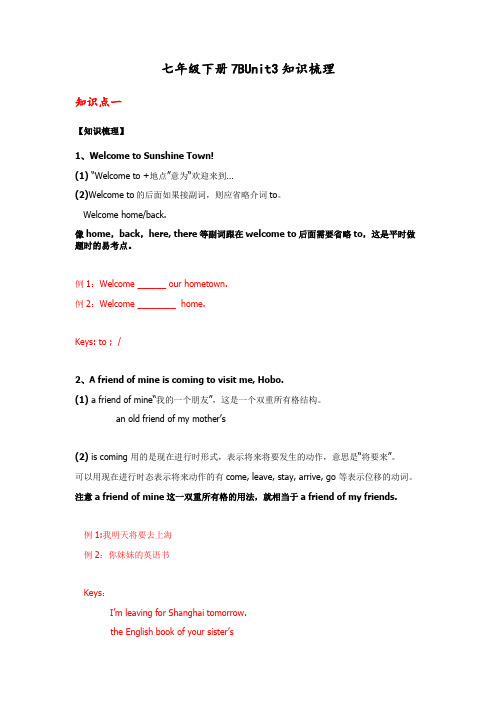
七年级下册7BUnit3知识梳理知识点一【知识梳理】1、Welcome to Sunshine Town!(1)“Welcome to +地点”意为“欢迎来到…(2)Welcome to的后面如果接副词,则应省略介词to。
Welcome home/back.像home,back,here, there等副词跟在welcome to后面需要省略to,这是平时做题时的易考点。
例1:Welcome ______ our hometown.例2:Welcome ________ home.Keys: to ; /2、A friend of mine is coming to visit me, Hobo.(1)a friend of mine“我的一个朋友”,这是一个双重所有格结构。
an old friend of my mother’s(2) is coming 用的是现在进行时形式,表示将来将要发生的动作,意思是“将要来”。
可以用现在进行时态表示将来动作的有come, leave, stay, arrive, go 等表示位移的动词。
注意a friend of mine这一双重所有格的用法,就相当于a friend of my friends.例1:我明天将要去上海例2:你妹妹的英语书Keys:I’m leaving for Shanghai tomorrow.the English book of your sister’s3、But there’s nothing in the fridge.(1) nothing是不定代词,用在句子中代替物体,意为“没有什么”,具有否定意义,相当于not anything。
Nothing一般用于回答What引导的疑问句,表示什么都没有。
(2) nothing在句首作主语时,谓语用单数,修饰语放在代词后面类似的已学过的还有something,anything,somebody,anybody,nobody等。
7B Unit 3 知识点梳理
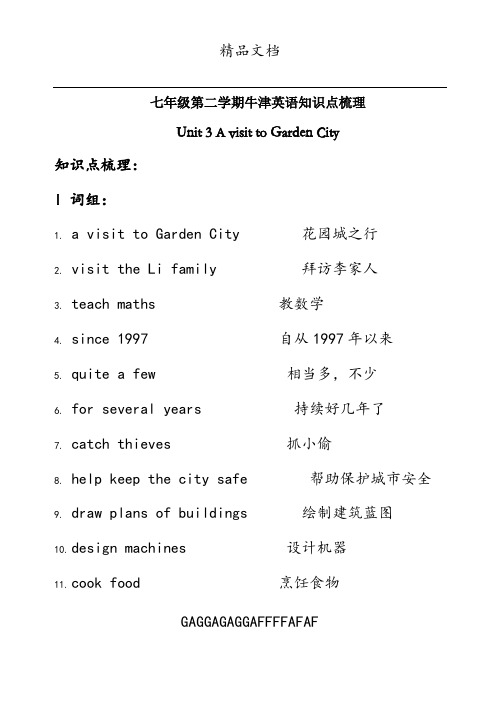
七年级第二学期牛津英语知识点梳理Unit 3 A visit to Garden City知识点梳理:I 词组:1.a visit to Garden City 花园城之行2.visit the Li family 拜访李家人3.teach maths 教数学4.since 1997 自从1997年以来5.quite a few 相当多,不少6.for several years 持续好几年了7.catch thieves 抓小偷8.help keep the city safe 帮助保护城市安全9.draw plans of buildings 绘制建筑蓝图10.design machines 设计机器11.cook food 烹饪食物GAGGAGAGGAFFFFAFAF12.bring food (to people) 端菜13.grow vegetables 种蔬菜14.type letters 打字15.answer the phone 接听电话16.deliver letters 递送信件17.train someone in sport 在体育方面训练某人18.drive a bus 驾驶公共汽车19.be in charge of a school 负责管理一所学校20.in fields 在农田里21.be used for doing sth. 被用做干某事22.tell the time 报时23.key ring 钥匙圈24.hold the keys 挂钥匙25.take the cable car 乘缆车26.carry people up the hill 运载人们上山GAGGAGAGGAFFFFAFAF27.the top of a hill 山顶28.have a good time 过得愉快II. 词性转换:1. teach (v.) 教, 讲授, 训练teacher (n.) 教师Her mother is a teacher and she teaches English. (teach)2. safe (adj.) 安全的, 可靠的safely (adv.) 安全地, 确实地GAGGAGAGGAFFFFAFAFsave (v.) 挽救,节约safety (n.) 安全,We cannot live without water. Please save every dropof water.They arrived in Shanghai safely last night.Here are some safety rules.3. use (v./n.) 使用, 应用useful (adj.) 有用的In the past, people used fire to cook food. Now, we can use fire to do a lot of things.Fire is very useful in many ways.4. farm (n.) 农场, 农庄farmer (n.)农场主; 农夫GAGGAGAGGAFFFFAFAFHis father is a farmer and he works hard on his farm. 5. wait (v.) 等待waiter (n.) (男)服务员waitress (n.) (女)服务员The restaurant is very popular, so lots of people are waiting for their dishes.The waiters and the waitresses are busing with their work.6. engine n. 引擎,发动机engineer n. 工程师A fireman always drives a fire engine.His father is an engineer.III. 语言点/句型:GAGGAGAGGAFFFFAFAF1. A watch is used for telling the time.be used for + doing sth. 意为“被用来做……”同时此句还可写成:We use a watch to tell the time.[e.g.] Water can be used for putting out fires = We can use water to put out fires.请记住以下句型:主语(人) use sth. to do …相当于主语(人) use sth. for doing…用某物做某事sth. be used to do…相当于 sth. be used for doing…某物被用来做某事IV. 语法The present perfect tense现在完成时A.概念及用法:1.表示过去发生的动作对现在造成的影响或结果。
牛津英语7B Unit3 单元知识点解析
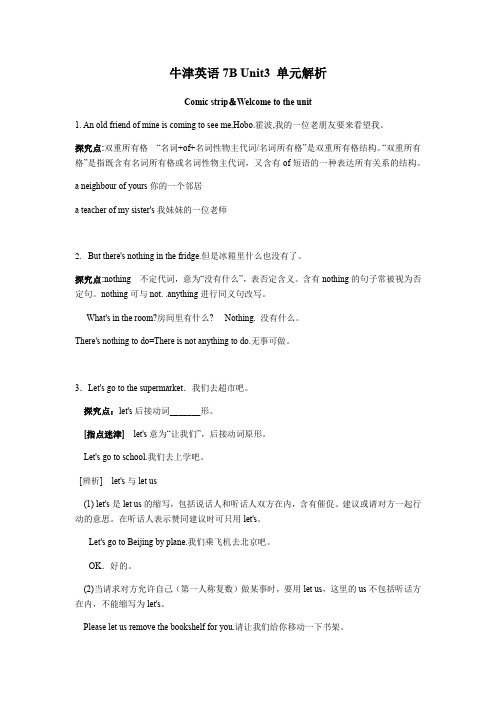
牛津英语7B Unit3 单元解析Comic strip&Welcome to the unit1. An old friend of mine is coming to see me,Hobo.霍波,我的一位老朋友要来看望我。
探究点:双重所有格“名词+of+名词性物主代词/名词所有格”是双重所有格结构。
“双重所有格”是指既含有名词所有格或名词性物主代词,又含有of短语的一种表达所有关系的结构。
a neighbour of yours你的一个邻居a teacher of my sister's我妹妹的一位老师2.But there's nothing in the fridge.但是冰箱里什么也没有了。
探究点:nothing 不定代词,意为“没有什么”,表否定含义。
含有nothing的句子常被视为否定句。
nothing可与not. .anything进行同义句改写。
----What's in the room?房间里有什么?----Nothing. 没有什么。
There's nothing to do=There is not anything to do.无事可做。
3.Let's go to the supermarket.我们去超市吧。
探究点:let's后接动词_______形。
[指点迷津] let's意为“让我们”,后接动词原形。
Let's go to school.我们去上学吧。
[辨析] let's与let us(1) let's是let us的缩写,包括说话人和听话人双方在内,含有催促、建议或请对方一起行动的意思。
在听话人表示赞同建议时可只用let's。
- Let's go to Beijing by plane.我们乘飞机去北京吧。
- OK.好的。
(2)当请求对方允许自己(第一人称复数)做某事时,要用let us,这里的us不包括听话方在内,不能缩写为let's。
牛津译林英语七年级下册7BUnits3-4单元复习课件
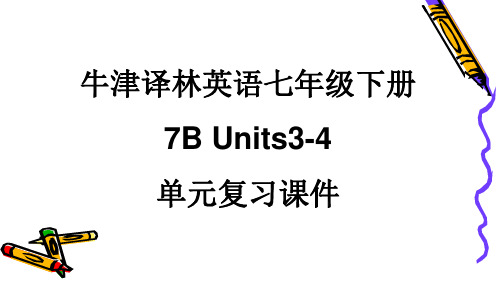
9. _h_o_m__e_t_o_w_n_(n.)家乡 10. ___w_h_e_a_t_(n.)小麦
双词性 11. __r_o_w___(n.)(一)排,(一)行
(v.)划(船) ★_r_o_w__a_b__o_a_t 划船 单一词性 12. __p_a_t_h___(n.)小路,小径 13. __t_r_ip____(n.)旅行,旅游 8次 14. _r_e_m__e_m_b__er_(v.)记得,记住 6次
2. There are many flowers and trees around my house. Every day, I can _s_m_e_l_l _th__e_f_lo_w__er_s__a_n_d_h_e_a_r__th_e__b_i_rd__s_s_in_g____. 我的房子周围有很多花和树。每天我能闻到花香,听到鸟鸣。
[P33]
15. ___f_o_r_es_t_(n.)森林 16. ___la_u_g_h__(v.)笑,大笑 5次 ★____la_u_g_h__a_t__ 嘲笑 17. __b_r_i_d_g_e_(n.)桥 18. ___si_g_n___(n.)指示牌
19. _t_r_e_a_s_u_r_e(n.)宝藏 20. _t_r_a_ff_ic_(n.)交通,来往车辆 3次
★_w__o_r_k_o_u_t____ 算出;解决
★ __tu__rn__.._.i_n_to_._.._ 把……变成…… [更多turn短语见《话题词汇记背 手册》P49]
重点短语
动词短语 1._w_a_i_t_a__m_i_n_u_t_e 等一会儿 2._lo_o_k__fo_r_w__a_r_d_t_o__ 盼望, 期待 3.__b_e_lo_n_g__t_o___ 属于
- 1、下载文档前请自行甄别文档内容的完整性,平台不提供额外的编辑、内容补充、找答案等附加服务。
- 2、"仅部分预览"的文档,不可在线预览部分如存在完整性等问题,可反馈申请退款(可完整预览的文档不适用该条件!)。
- 3、如文档侵犯您的权益,请联系客服反馈,我们会尽快为您处理(人工客服工作时间:9:00-18:30)。
七年级牛津版(7B)期末复习Units5-6提纲重点词组be at home alone 独自在家hear somebodyShouting 听到某人大叫rush into 冲进去hurt one's leg 弄run back to her flat 跑回她的家pour water over herjacket把水倒在夹克衫上be in hospital 住院help each other互相帮助by oneself 独自sounddangerous 听起来很危险your own safety 你自己的安全be careful withmatches 小心火柴leave the stove on 让炉子开着the BestSportswoman Award最佳女运动员奖this year's Youth Award 本年度青少年奖 a super swimmer一个游泳健将fall into the water 跳入水中begrateful for one's help 感激某人的帮助in the past 在过去 row a boatforget to bring a football忘记带足球catch a fishwithin five minutes 五分钟之内think of others考虑别人lose the game 输了比赛lose one's way迷路do one's best 尽力be weak atgeography 地理很薄弱play the piano well 钢琴弹得好have good gradesin Chinese 语文成绩好get into the school team 进入校队get better results in 取得好成绩have a good memory 记忆力好No problem. never mind 别介意be thoughtful 考虑周全parents' meeting 家长会hear from somebody 收到来信be able to 能够sleep on one's lap 睡在膝盖上hold it in my hand 把它拿在手里feed the rabbit carrots 喂给兔子胡萝卜chase / run after a ball 追赶球with eyes open wide 眼睛睁得很大do wonderful tricks 做精彩的把戏look after him until the end 照顾他到永远a rabbit hutch 兔笼 a fish tank 鱼缸on top of a piano 钢琴的顶上an open drawer 一只开着的抽屉most of the time 大多数时候 make a lot of noise发出许多声音ring the doorbell 按门铃 a black and white tail 黑白相间的尾巴look around for ... 四处寻找...... take care ofget tired 感到累frighten the cat 吓唬猫take the dog for a walk 遛狗brush the dog's fur 给狗刷毛all over our flat 遍及我公寓bark alot 经常叫be busy at work all day 整天忙于工作take ... out ofthe water 从水里拿出来listen to a talk on ... 听一个...的讲座look the samekeep the fish tank clean 鱼缸保持干净bark at people 朝pieces of string 线团keep the dog on alead 把狗系在项圈里make sure 务必lookbeautiful in the sun 在阳光下看起来很美build me camps out of sticks 用树棍帮我搭帐篷organize class activities well 班级活动组织得好put out the fire with a blanket 用毯子扑灭火burn one's neck and arms 烧伤脖子和胳膊keep one's life from danger 使某人的生命远离危险keep long hair away from fire 使长发远离火What happened to ...? 发生了什么事put something hot into the rubbish bin 把烫的东西扔进垃圾桶recommend somebody for ... Award 推荐某人为....奖the Most Helpful Student Award 最乐于助人学生奖collect things for Project Hope 为希望工程募集visit a home for the elderly 参观老年之家help somebody out of a fire 把某人救出火海There's a small chance that I will not play. 我不玩的可能性很小It's highly possible that I'll go walking. 我很可能去散步go walking instead of swimming 去散步而不去游泳teach somebody how to dance 教某人如何跳舞She isn't any trouble.她不惹麻烦on the edge of the window-ledge 在窗台边缘knock on the cage door with his beak 用喙敲鸟笼的门put some stones at the bottom of the tank 把石头放鱼缸底部语法精讲1. 情态动词can和could1) 都能用来表示人拥有的某种能力,意思是"会,能"A. can用在一般现在时,而could用在一般过去时,如:I can swim now, but I could not swim when I was young.B.在各种句型中要遵守情态动词的一般规则肯定:can / could + do(动词原形,并且与人称和时态无关)否定:cannot / could not + do (can的否定形式是cannot与can't,一般不写成can not,could not的缩略形式是couldn't)疑问:Can / Could + 主语 + do2) 都能用来表示事情发生的可能性,意思是"可能"A. can用在一般现在时,而could用在一般过去时,如:We can see a monkey show in the zoo today.He could not play football yesterday because he didn't bring his boots.B. 在各种句型中也要遵守情态动词的一般规则3) 其他相关用法A. can还可表示"建议,请求",常用Can I ...? 或Can you ...?等结构,如:Can I help you? Can you give me a hand?B. could用在现在时或将来时,也可表示"请求",但语气比can客气委婉,如:Could you lend me your bike?C. could用在现在时或将来时,有时还可表示可能性不大,如:Uncle Wang could come to our party this evening. (今晚会来,但可能性不大)D. can和could还常被用在否定句和疑问句中,表示"猜测,惊异,怀疑"等,can表示对现在的猜测,而could表示对过去的猜测,如:I saw Mr. Black at the school gate a few minutes ago. He can't be in his office now.(can't表示"不可能"之意)Can this smart child do such a stupid thing?2. 情态动词may和might当知道某事有可能发生后,我们就可以进一步讨论这件事情具体发生的几率。
如果这件事情很有机会发生时,我们可以用may,若机会较小,我们就用might。
1) 两者都是情态动词,在各种句型中要遵守情态动词的一般规则肯定:may / might + do(动词原形,并且与人称和单复数无关)否定:may / might + not + do疑问:May / Might + 主语 + do2) may的用法A. 表示"猜测",用于现在和将来发生的事情,如:My father may not go to work today.B. 表示"同意,许可",或用在疑问句中表示"征得对方的许可",如:Boys and girls, you may open your eyes now.--- May I come in? --- Yes, you may. / No, you may not. (or No, you mustn't.)▲ 在表示"不准,禁止"等意思时,常用must not / mustn't来代替may not。
▲ 在对 "May I ...?" 问句作肯定回答时,通常不用 "Yes, you may."而用 "Yes, please / of course.或Certainly. 作否定回答时,常用 "Please don't."或"No, you mustn't."3) might的用法A. 表示可能性小一些,对事情发生的可能有所怀疑,如:I might pass the exam tomorrow.B. 也可表示"许可",但语气较委婉客气些,如:You might come and play with us if you would like.C. 也可作为may的过去时,如:He was afraid he might go the wrong way.3. 祈使句(Imperative sentence)祈使句是表示请求、给予命令或指示的句子。
